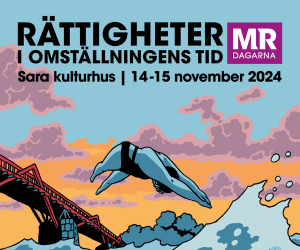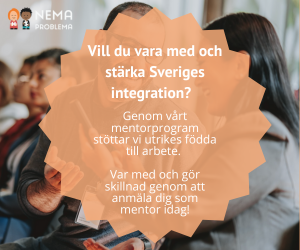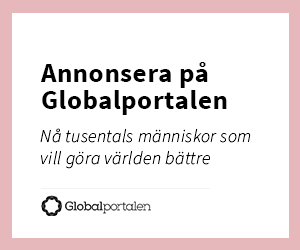Enoch Akhaine has been working as a fundraiser for UNICEF since September 2018. Globalportalen met up with him to talk about surprising encounters, friendly Swedes and how to convince people for the right cause.
Why did you decide to apply for the fundraiser position at UNICEF?
I was looking for jobs and saw the ad online. I thought “wow, this is amazing – UNICEF is looking for English-speaking fundraisers”. I had been in contact with UNICEF in 2003 when they came to Nigeria to provide mosquito nets. I worked as an editor for a university newspaper at the time and was invited to their workshop. I felt happy that this opportunity popped up, UNICEF have done a lot globally so I decided to apply for the job.
What was your impression when you first started the job?
My impression was positive, from the word “go!”. I knew fundraising was something to do on the streets, but I didn’t know how to do it. We had a two-day training, where we learned more about UNICEF and about how to engage and approach people. We also learned how to use the correct information – for example when you say 100 SEK buys 66 polio vaccines. People want to see that statistical information, it helps them support our work.
What does a typical work day look like?
When I go out for my job on a typical day it’s all about approaching people and engaging them in conversations. We go out in two big teams and head to two different locations in the city.
Sometimes you get tired, then you take a break to cool your nerves before getting back to work. It’s also about the team spirit and having the team time with your colleagues. We joke, have fun and eat lunch together.
I’ve learned that I can convince people! It’s amazing!
What’s the best part of the job?
Well, the best part is getting pledges [when people sign up to give monthly donations]. Getting pledges makes you feel fulfilled and feel like the plane has successfully landed (laughs). Being in the sky is tough – when people say no. But when you get one, two or three pledges – it just settles your day. That’s the best part of the job.
What’s the most challenging part of the job?
It’s the opposite of what I just said. Not getting pledges the whole day is very challenging. You feel that you are not delivering. In my six months of working, I think I’ve had seven or eight days with no pledges. It doesn’t sound like very much, but it feels like a lot to me on those days. Another challenge is people not being friendly, sometimes you feel “oh that person wasn’t nice to me”. But then me and my colleagues encourage each other and say “that person is just one in a billion, don’t worry”.
How do you manage to let go of negative feelings after a bad day?
I used to contact my manager and say “oh, I didn’t get a pledge today” and then she sent me a text and said “Don’t worry! Just go home, be with your family and enjoy the rest of the day. Tomorrow is another day.” That was a great encouragement! So, typically, if I don’t get a pledge, I think about my beautiful wife and my two lovely kids and then I forget about it.
Has your way of approaching people changed since you first started the job?
Mostly I speak from the heart. In the beginning, I tried to use statistics but as time goes and you mature with the job the statistics will just come in when necessary. Being creative in the job has also helped me. I use people’s situations to start conversations. For example, I met a lady who was just hanging around. She just lit a cigarette and I said “do you know that the way you have lighted a cigarette up, you could also light up a child’s life?”. She was so happy and she signed up!
You are an ambassador, you are part of a historic brand and you shouldn’t be afraid of people being unfriendly. And to be honest, people in Sweden are very very friendly and kind.
Another time we only had 15 minutes until we closed for the day, and I had no pledge that day. So I stopped a lady and told her “your decision in the next 15 minutes will save children’s lives”. And she became curious and asked me why, so I said “we are closing in 15 minutes and each pledge we get before then will help save children’s lives” – and she signed up!
What would you say to someone who is thinking about applying for a fundraiser position but is worried about the challenges?
When I am approaching people am not approaching them as Enoch Akhaine, I am approaching them as Enoch Akhaine who works for UNICEF – that’s a different thing! People can be unfriendly, that’s okay, we are all different. But you have to remember that most people are more intimidated by you than you are of them. You are putting on a UNICEF ID-card – that is a historic symbol. You are an ambassador, you are part of a historic brand and you shouldn’t be afraid of people being unfriendly. And to be honest, people in Sweden are very very friendly and kind.
What is your best memory from the job?
I was in Gävle for a hockey event, and I met someone who was very negative about organisations. He said that they are just taking the money, they don’t do anything with it and only pay themselves high salaries. We talked for over an hour and in the end he signed up and said I changed his perspective!
If I don’t get a pledge, I think about my beautiful wife and my two lovely kids and then I forget about it.
What have you learned from this job?
I’ve learned that I can convince people! It’s amazing! I didn’t know I could – but with training from UNICEF, my education in communication and perhaps my natural endowment I’ve learned over time that I can convince people for the right cause, for good things.
How long do you think you’ll be working as a fundraiser?
I think that if your mind is in the right perspective to do a job – not just to get salary, but to change the world – then I think it is something you can do for a very long time. And this is a job I would like to do for a very, very, very long time.


